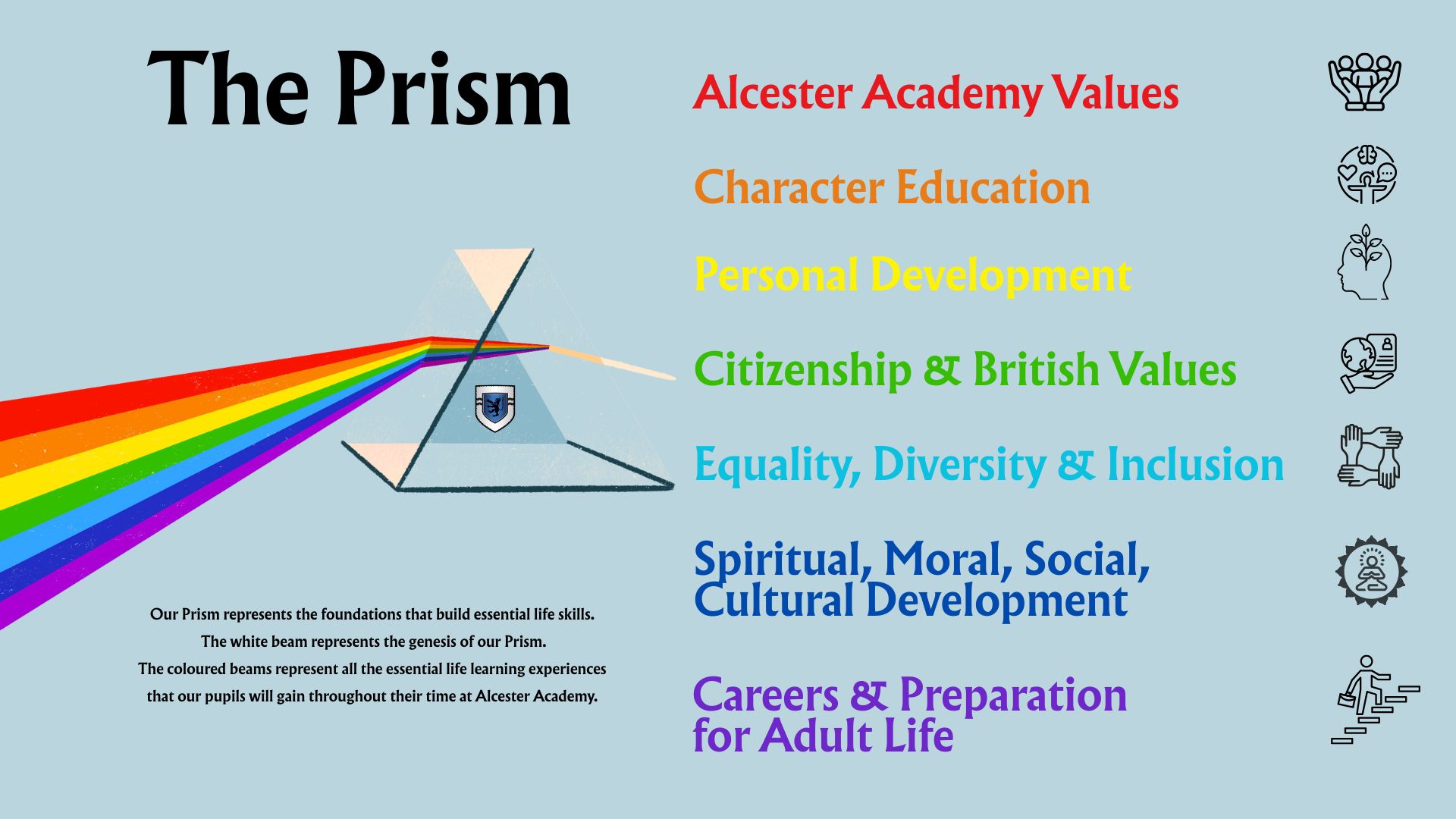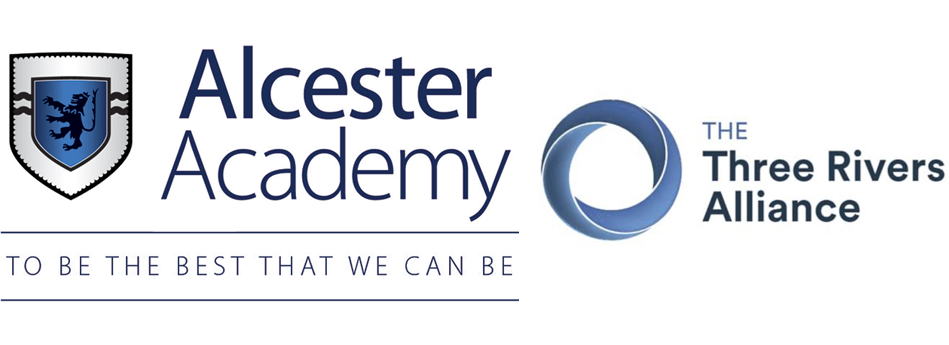Curriculum
Whole School Intent, Implementation & Impact

Curriculum
Whole School Intent, Implementation & Impact
Mission Statement
Alcester Academy provides an outstanding education through the delivery of a high quality, diverse and inclusive curriculum which allows all of our students to thrive and fulfil their own, personal potential.
We aim that our students will become responsible members of the community with high moral values, self-discipline and resilience. They will progress successfully into education, employment or training, holding a valuable combination of knowledge and skills in preparation for their future lives.
Curriculum Intent
The staff, governors and students at Alcester Academy have worked hard to create a curriculum within school that is modelled on the fundamentals of the National Curriculum and the preparation needed for life in Modern Britain. This curriculum:
- offers breadth and depth across all subject areas
- ignites opportunities for all groups of learners to succeed in and outside of the classroom environment
- supports the development of students’ spiritual, moral, social and cultural awareness with a view to creating well educated citizens for their future personal development
- understands the individual needs of all students and supports their educational journey an inclusive, safe and secure environment
- drives development within literacy, numeracy and oracy
- equips our young people with the knowledge, advice and support to become resilient, confident and independent learners
- supports the context of the local community that we belong to, whilst opening doors to explore the values and beliefs of others in our world
- prepares the young people in our care for the challenges and opportunities of the 21st century world in which we live to include work around sustainability and equality, diversity and inclusion.
Curriculum Implementation
Alcester Academy is an 11-16 secondary school that provides education for students in key stage three and four. The timetable operates across 25 one hour lessons per week. There is a tutor session at the start of each day where students are split into horizontal year groups. There is a fixed tutor programme for each week celebrating school values across a curriculum that we call The Prism, along with an assembly programme. The Prism
Students are supported in tutor time with literacy and numeracy activities. Year 11 also use tutor time for GCSE interventions in English, maths, MFL and science. This intervention is reviewed on a regular basis by a dedicated team of subject specialists along-side SLT.
We encourage students to participate in a rich diet of additional learning opportunities and visits throughout their time at the academy. We believe that these are integral to their personal development and underpin their life-long learning as well as supporting our formal curriculum. Core subjects are taught in ability groups. These are monitored through formal assessments and adapted as required through the academic year. All other subjects are taught in mixed ability sets.
Key Stage 3
We offer a two year Key Stage 3 where all students are able to access a broad and balanced curriculum designed to foster their curiosity and wider understanding and knowledge in a variety of subjects.
In Year 7 all students study a broad curriculum of: English, Mathematics, Science, History, Geography, French or German, ICT. Art, Performing Arts (Music and Drama), Design & Technology, PE and one dedicated lesson for our personal development curriculum each week.
Students select their GCSE option subjects in the summer term of Year 8. They are supported by a series of information evenings alongside their parents/carers, and activities within school in order to support factually based decisions that will help to provide the knowledge and skills to take advantage of opportunities, responsibilities and experiences of later life. A full school report is issued before parents and students select option choices.
We strongly believe in our decision to maintain a two year key stage three curriculum for the following reasons:
- No ‘dip’ after KS2 as every second counts to cover the expected curriculum content over two years
- A two year KS3 maintains positive attitudes to learning
- Students are able to ‘personalise’ their curriculum sooner
- Work should be more challenging as the content is covered at a quicker pace
- The shorter time period has helped us to revise schemes and improve the quality of education at KS3 as evidenced in our Curriculum Palettes.
- The school has a wealth of additional opportunities that keep learning alive outside of the timetabled KS3 curriculum.
Year 9
Students begin KS4 courses in year 9 at Alcester Academy. Learning is enhanced through a wealth of additional opportunities to include trips, clubs and calendared enrichment days which surround and inform their option pathways. Our planned enrichment days, in particular, will make sure all pupils continue to expand their knowledge of the creative, STEM and humanities aspects of the curriculum.
Year 9 have access to a passport document where extra-curricular opportunities and experiences can be recorded during the academic year. Throughout years 7 to 9, we aim to ensure that all pupils have had full exposure to a variety of enriching experiences and opportunities.
For KS4 learners who might find the core offer more challenging, they can select an option to continue with additional maths and English for three years from year 9. In some cases, these learners might be entered for AQA units in selected option subjects, functional skills in English, or entry level certifications in maths (number and measure) - this is considered on an individual basis.
KS4
- Students have greater years studying KS4 content and therefore become more inquisitive about their learning; more motivated too
- Greater depth is developed as a result
- Students enjoy having access to specialist teachers and this enhances outcomes
- Time is spent over a longer period to embed content and subject knowledge
Key Stage 4
All students follow a three year key stage four curriculum. The majority of students currently study for level two qualifications in English Language and Literature, a qualification in maths, science and Religious Studies. This provides between 6-7 qualifications as a school core. The majority of students then follow level two courses in four other subjects over this key stage.
This curriculum model provides the time required for students to develop key knowledge and understanding within their chosen subject areas.
Students are often excited to take new courses, and the school is careful to offer some taster sessions in the run up to their choices in order to help them make informed decisions. Additional subjects available to students in Year 9 include Food and Nutrition, Media, Sport, IMedia and Photography. Existing subjects offer qualifications in French, German, History, Geography, Music, Performing Arts, Design Technology, Textiles and Fine Art. The school offers GCSE and vocational courses. GCSEs are examined at the end of Year 11, and vocational courses offer different assessment routes. Students like having both style of courses available to them and this meets the needs of the majority of our learners well.
For KS4 learners who might find the core offer more challenging, they can select an option to continue with additional maths and English for three years. They might be entered for AQA units, or entry level certification.
In Year 11, the Academy offers students a range of revision opportunities from after school sessions to Saturday morning workshops. An alternative timetable is then designed in order to support students in the final steps of their journey to their GCSE exams.
Throughout key stage 3 and 4, the school designs ‘Super Learning Days’ (SLDs) in order to cover aspects of the curriculum that require more time or attention. These are related to developing knowledge and understanding around personal development and well-being, safeguarding and emotional development including issues related to bullying, online safety, alcohol and drugs education, mental health, child sexual exploitation, relationship education and preparation for exams. In Year 9, students have curriculum days in order to be certain that broad and balanced learning opportunities exist.
Curriculum Impact
The impact of the curriculum is measured in a number of ways over time to include:
- Student attendance to school. We consider attendance to be excellent and this acts as an indicator to the success of the curriculum and the support offered to students at school.
- Assessment and progress data. All subject areas are lined managed by members of the senior team and the assessment and progress data for each area is scrutinised at each of the three points during the academic year. Governors are also aware of this data. Students’ attitude to learning scores are monitored closely and any significant changes in patterns with these are investigated.
- Positive behaviour in lessons. Incidents of low level in class disruption have fallen significantly in recent years indicating that students want to learn and are engaged in this process.
- KS4 outcomes. In 2024, Progress 8 was measured as +0.66 and significantly above the national average. The school was ranked in 76th place in the Fairer Schools Index nationally and within the top ten schools in the Midlands. In 2025, indicative Progress 8 would have been +0.82 and significantly above national average in key performance indicators.
- Student voice. Students tell us that they like their learning and enjoy the opportunities made available to them.
- Additional learning opportunity uptake/trip uptake. There is a vast offer of additional learning opportunities and trips for students. These are monitored very closely.
Personal Development
Our students are our best ambassadors, they are proud to be part of Alcester Academy. There is a calm atmosphere around the school, and this is always commented on by visitors to the school. Student’s attendance and punctuality to school and lessons is excellent. Students want to attend as they enjoy school and learning, and this is embedded through our ethos and school values and shown by their positive attitudes to learning and their engagement in additional opportunities. The expectation is that all students will attend 100%. Any students that struggle with attendance and punctuality are supported to improve.
Students self-manage at break times and lunchtimes and need minimal input from duty staff. We have a strong student leadership team who participate in many activities representing the school, leading student council and major school events such as the annual celebration evening. We have a large majority of our KS4 students who apply to be prefects and School Captains. Students across all year groups are given opportunities to be involved in student leaderships –tutor reps for year group council, sports leaders, subject leaders including numeracy, literacy and MFL leaders, digital leaders, teaching and learning ambassadors, sustainability leaders, STEM ambassadors and student librarians.
The school takes effective measures to continually educate the students about all aspects of bullying, cyber bullying and child on child abuse both offline / online through assemblies, tutor work and super learning days. LSU supports many students across the school when they need additional support or guidance with their behaviour, attendance, welfare or pastoral issues.
Behaviour is outstanding and any issues are dealt with consistently and effectively by all staff. Poor behaviour should not inhibit the learning of others. Permanent exclusions are rare. Fixed term suspensions are used when it is deemed necessary, in most cases these are one off incidents and students do not receive further suspensions. All fixed term suspensions are followed by a re-admittance meeting that has to be attended by parents / carers and led by SLT and a period of behaviour monitoring through our LSU which is tailored to the individual child and their needs.
SMSC
Spiritual, Moral, Social and Cultural (SMSC) development is the over-arching umbrella that encompasses personal development across the whole curriculum.
Ofsted continue to put SMSC ‘at the heart’ of school development. It requires schools to think about the kind of people we aspire to be, the kind of world we aspire to create, and the kind of education we aspire to provide.
SMSC Long Term Plan - years 7 & 8
SMSC Long Term Plan - years 9, 10 & 11
Relationships and Sex Education (RSE) Long Term Plan - years 7 & 8
Relationships and Sex Education (RSE) Long Term Plan - years 9, 10 & 11
The work that Alcester Academy completes with students around personal development and SMSC is encompassed in a programme called The Prism. Pastoral Development |The Prism





